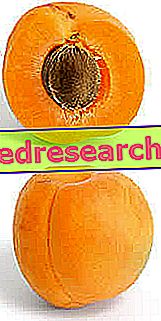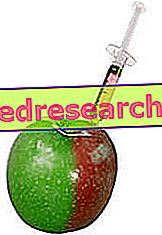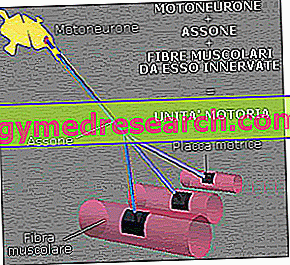Generality
Apricots are summer fruits rich in vitamin A and vitamin C. From a botanical point of view, these are the apricot drupes, a plant belonging to the Rosaceae family, Genus Prunus, P. armeniaca species; the binomial nomenclature of the apricot is therefore Prunus armeniaca .

The apricot tree can reach considerable dimensions, but in cultivation its growth is moderated to facilitate fruit harvesting. It is a deciduous plant, with green leaves, cuneiform and marginally serrated; the flowers (which bloom in spring, before the leafing) have white-pinkish petals. The fruits are yellow or orange, sometimes shaded in red, and velvety with a very thin hair; they reach smaller sizes than peaches but larger than cherries (belonging to the same genus).
NB . The apricot orchards are among the most delicate of the entire category. These plants, which tolerate the cold well but prefer temperate and generally dry climates, show a precocious flowering and production of the fruit compared to the other trees of the genus Prunus ; these characteristics make them vulnerable to spring temperature changes and above all to "frosts". Moreover, particularly rainy or dry seasons compromise their immunity to mold, viruses and bacteria.
The apricots on the market belong to different botanical varieties, the best known are: Pindos apricots, Diavole apricots, Preole apricots, Imola real apricots, Valleggina apricots, Amabile Vecchioni apricots and Thyrintos apricots.
Fresh and "seasonal" apricots are present on the fruit stalls in the early summer, although they are present all year round in preserved form: dried apricots, syruped apricots, jam or apricot jam, apricot jelly and fruit juices apricot. In particular, gelatine is a very common ingredient in central-northern European pastry, while apricot almond, like that of peach, is a very widespread bitter aromatization ingredient (although controversial, since it contains hydrocyanic acid, a potentially harmful molecule). in small doses).
Nutritional characteristics
Fresh apricots are fruits rich in water, vitamins, mineral salts and dietary fiber, while the energy supply (deriving mainly from simple carbohydrates) is among the lowest in the entire category.
Among the electrolytes, potassium predominates, while as far as vitamins are concerned, notable contributions of retinol equivalent (vitamin A in the form of β-carotene) and vitamin C are observed.
The apricots in syrup are cooked, therefore they do not contain the same concentration of vitamin C as the fresh fruit; moreover, being immersed in the syrup, they bring quantities of simple sugars and much more total calories than the raw material.
Dehydrated apricots have a higher nutritional content since they are deprived of the water component but, in general, they are not added to sugar (instead used in the production of candied fruit); on the other hand, many producers use sulphite- type food additives as powerful antioxidants against fruit browning.
Nutritional composition of the Apricots - Reference values of the INRAN Food Composition Tables
| Apricots, fresh | Apricots, dehydrated | Apricots in syrup | Apricots, dried | ||
| Edible part | 94.0% | 100.0% | 100.0% | 100.0% | |
| water | 86, 3g | 3.5g | 80, 0g | 25, 0g | |
| Protein | 0.4g | 5, 6g | 0.4g | 5.0g | |
| Lipids TOT | 0.1g | 1.0g | 0.1g | 0.5g | |
| Saturated fatty acids | - g | - g | - g | - g | |
| Monounsaturated fatty acids | - g | - g | - g | - g | |
| Polyunsaturated fatty acids | - g | - g | - g | - g | |
| Cholesterol | 0, 0mg | 0, 0mg | 0, 0mg | 0, 0mg | |
| TOT Carbohydrates | 6, 8g | 84, 6g | 16, 1g | 66, 5g | |
| Starch | 0.0g | 0.0g | 0.0g | 0.0g | |
| Soluble sugars | 6, 8g | 84, 6g | 16, 1g | 66, 5g | |
| Dietary fiber | 1.5g | - g | 0, 9g | - g | |
| Power | 28, 0kcal | 349, 0kcal | 63, 0kcal | 274, 0kcal | |
| Sodium | 1.0 mg | 33, 0mg | 10, 0mg | 26, 0mg | |
| Potassium | 320, 0mg | 1260, 0mg | 150, 0mg | 979, 0mg | |
| Iron | 0.5mg | 5, 3mg | 0.2mg | 5, 0mg | |
| Football | 16, 0mg | 86, 0mg | 19, 0mg | 67, 0mg | |
| Phosphorus | 16, 0mg | 139, 0mg | 8, 0mg | 108, 0mg | |
| Thiamine | 0, 03mg | tr | 0.01mg | 0.01mg | |
| Riboflavin | 0, 03mg | 0, 08mg | 0.01mg | 0, 16mg | |
| Niacin | 0, 50mg | 3, 60mg | 0, 30mg | 3, 30mg | |
| Vitamin A | 360, 0μg | 1410, 0μg | 26, 0μg | 1090, 0μg | |
| C vitamin | 13, 0mg | 15, 0mg | 5, 0mg | 12, 0mg | |
| Vitamin E | - mg | - mg | - mg | - mg | |
Fruit Juice Without Extractor - Apricot Juice
X Problems with video playback? Reload from YouTube Go to Video Page Go to Video Recipes Section Watch the video on youtube



